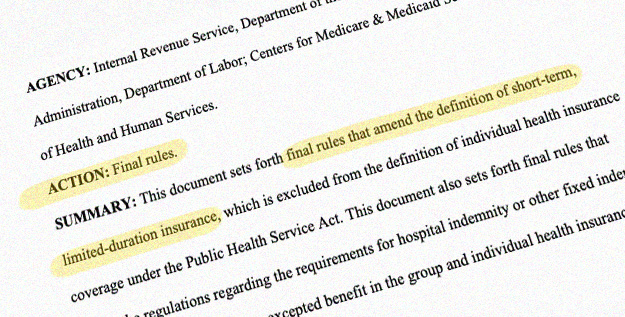EDITOR’S NOTE: Healthinsurance.org’s Curbside Consult is a periodic informal dialogue with medical and health policy experts about pressing issues of the day.

Larry Levitt, of the Kaiser Family Foundation, left, and Curbside Consult host Harold Pollack
Larry Levitt is one of the nation’s leading experts on health reform. He is Senior Vice President of the Kaiser Family Foundation, where he heads the foundation’s program that tracks implementation of the Affordable Care Act. We caught up just after election day to discuss how Republican victories might change the on-the-ground realities of health reform.
Below is a transcript of our conversation. It’s been edited to make the translation between spoken and written English.
Transcript of Part 2 (of 3):
The 2014 election
Harold Pollack: Let’s get to the election. Republicans did well on Tuesday. How do you think that’s going to change the on-the-ground reality of health reform?
Larry Levitt: In many ways, it’s not going to change things very much at all. I think the law is highly likely to remain intact. Even if Republicans are successful in some of their proposals to change the law, I don’t think any of those get to the heart of the law or cross the line that the President drew in the sand regarding anything that rolls back the coverage expansions.
I think the biggest effect is probably in the states. Had some of the governors’ races – or state legislative races – gone differently, we might have seen more states moving to expand Medicaid. I don’t think that’s likely to happen now. It’s highly unlikely.
Harold Pollack: What are the states where you’d particularly make that comment?
Larry Levitt: There were a number of governors’ races that were up in the air in states that haven’t yet expanded. For example, Maine might have gone differently. In Alaska they still haven’t called the election, and that could still go differently.
I don’t think any states are going to roll back. There’s some fear of that in Arkansas, particularly with the idiosyncrasies that their legislative process that require super-majority vote to reaffirm the program.
I think in the short term, the biggest affect of the election is maybe just the amount of noise it’s creating and how that might drown out public education efforts as we head into the second open enrollment.
If you look at the last open enrollment period, there was a lot of hoopla leading up to it and then an awful lot of hoopla once the website didn’t work. It’s pretty quiet right now. In fact, most of the air is being sucked out by discussion of what we’re just having, about what the election means. I think very little discussion of helping to educate consumers about their choices. And we know that consumers are confused.
Harold Pollack: Just on this point of consumer confusion, if you had five minutes to talk to every American over the East German-style PA system installed in every home (which I believe was one of the components of Obamacare), how would you use that five minutes to educate people?
Larry Levitt: Someone from Europe asked me yesterday, “So what is this Obamacare?” I needed to explain it simply. Really, it’s a very simple thing. Most people have insurance through an employer and people should take up those options if they can because you are subject to a fine if you don’t have insurance.
For those that don’t have access to insurance through an employer, there are options available to you. Go to HealthCare.gov, find out what those options are, figure out if you’re eligible. There’s substantial help available.
We’re talking about tax credits of thousands of dollars that many low and middle income people can qualify for. It’s a substantial benefit to people. They just need to know where to go. For those who don’t have access to a computer, there are probably not enough consumer assistance resources available in the community but there are resources available to help.
Harold Pollack: If people signed up last year, they need to double check that the plan they’re in still makes the most sense for them.
Larry Levitt: Absolutely. The way the intricacies of the way these tax credits work, they’re based on a benchmark plan, the second-lowest cost Silver plan in the area. The good news is that insurers are competing to be that benchmark plan. It’s almost textbook competition. Insurers are in many cases lowering their premiums, which is almost unheard of in healthcare in order to be one of those low-cost insurers. That’s the good news. That will certainly save the government money in tax credits they have to provide.
The bad news is it makes it more complex for consumers. Most consumers gravitated toward those low-cost insurers in the first year. If that insurer they signed up for is no longer a low cost insurer, they could find themselves with a big premium increase if they don’t shop around. People are going to be hearing messages over the next couple of weeks a lot about the need to shop.
Likely changes (or non-changes) to ACA
Harold Pollack: Let’s talk about what the Republicans might do now that they have a pretty solid Senate majority and a very large House majority. How do you think they will try to change the Affordable Care Act?
Larry Levitt: I would imagine they will try for a repeal vote, repealing the whole law, repealing the individual mandate and repealing the employer requirement. Even if those pass, the President will veto them. So I don’t think those will succeed.
Then I imagine they’ll turn to smaller tweaks to the law. A number of things have been talked about. There is altering the employer requirement, in particular altering the definition of full-time workers. Moving that from 30 hours a week to 40 hours a week.
There’s been a lot of talk of repealing the medical device tax, which was one of the taxes in the law used to finance the coverage expansions. Maybe introducing a Copper plan which would provide skimpier coverage than the lowest cost Bronze plan.
Right now I wouldn’t be surprised if they went after the IPAB, the board that’s there to recommend changes to Medicare if costs rise too quickly. These are all things that either appeal to certain interest groups or strike an ideological cord.
Harold Pollack: It’s striking that most of the things likely to be changed tend to increase costs or decrease revenue. The rhetoric against ACA claims to seek deficit reduction. Yet as Jon Chait points out, the actual provisions they go after are cost-containment or revenue provisions.
Larry Levitt: Absolutely. To get a law that costs money or increases the deficit, you generally have to find offsets to that. I suspect that will be the case here as well. I expect it will be much easier to get consensus or get enough votes for these changes that will be to get consensus on how to pay for them. For example, changing the threshold for full-time workers to 30 to 40 hours a week would increase the deficit by over $80 billion.
Harold Pollack: Can you explain why it would increase the deficit?
Should we weaken the employer mandate?
Larry Levitt: There are two reasons. First, moving that threshold means that there are fewer workers for whom employers are required to provide coverage or pay a penalty. You’re reducing the number of workers subject to the employer requirement. If employers don’t provide coverage to them, they will owe lower penalties. This reduces revenues to the federal government.
Second, it means employers will provide coverage to fewer number of workers. If those workers end up in the health insurance marketplaces or in Medicaid, this increases federal expenditures.
Harold Pollack: From a broader policy perspective, it will cost the federal government money but aren’t there real advantages to doing that? People will end up insured. Companies will offer higher wages to their part-time workers. Might there be some benefits to a change like that?
Larry Levitt: Yeah. The employer mandate is a tough issue both economically and ideologically. For the most part we’re talking about very-low-wage workers. Higher-wage workers can command health benefits. I don’t think that’s going to change. They’re going to have employer based health insurance in a vast majority of cases. That will be true for the foreseeable future.
We’re talking here about low-wage workers. Someone earning $15,000, $20,000 a year, the cost of a family health insurance policy costs almost as much as the wages some workers are getting … It’s not surprising they’re not covered,
Harold Pollack: For my own health insurance, the University of Chicago kicks in $17,000 a year, which would be about $8.50 an hour for a full-time worker. It’s unrealistic to expect low-wage employers to be paying anything close to that for the health benefits for their employees.
Larry Levitt: Absolutely. The way we subsidize employer-provided health insurance in this country is through the tax system. Those employer provided benefits are tax-free. This is a very regressive way to provide subsidies because it’s based on your marginal tax rate. If you’re a low-wage worker, your marginal tax rate is very low so you’re actually getting a smaller subsidy from the federal Government for that employer to provide health insurance.
Conversely if you don’t have access to employer-provided health benefits and you can go get insurance through an ACA marketplace, you’re getting an income based subsidy that’s much more substantial if you’re lower wage.
Those workers, if they do get higher wages, and that is an if, particularly in short term, they’re almost certainly better off not getting employer provided health benefits than getting them. It sounds counter-intuitive but it’s likely true.
Harold Pollack: If you were a liberal advocate advising President Obama or other liberals, would you whisper: “Why don’t you pretend to be really upset about the Republicans getting rid of the employer mandate and let them have a victory,” and then feel like, “Hey in the long run getting rid of the employer mandate would actually serve liberal ends if we just let it go.”
Larry Levitt: No question getting rid of the employer mandate would in many cases make low-wage workers better off. It also takes some difficult politics off the table. Many of the anecdotes we heard last fall – and I suspect we’ll hear them again this fall – are about employers reducing hours for workers and that is a consequence of putting that threshold at 30 hours per week.
Harold Pollack: Are those anecdotes actually representative of something that’s happening a lot? Do you think there are a lot of employers who are reducing employers hours because of ACA, or do you think it’s sort of anec-data that doesn’t really capture a larger reality?
Larry Levitt: I think the anecdotes are real. You can’t dispute the anecdotes. We’re not talking about a large number of employers or a large number of workers here. There just aren’t that many workers who are uninsured and working near that 30 hour threshold.
It’s not always so easy for employers to reduce hours. It’s disruptive to their business operations. It means they’ve got to hire more people and train more people. If they could have made these jobs part-time jobs already, they probably would have done it.
Harold Pollack: That’s the employer mandate. You mentioned a couple of other things; one was the medical device tax. Isn’t that sort of the normal pork barrel politics in Washington? Here’s an industry that just doesn’t want to pay a tax and they may be able to convince Congress to get rid of it. Is there any larger policy significance of this than just, “They’ve got more lobbyists than some other people?”
Do we care about that medical device tax?
Larry Levitt: I would say no. There isn’t much in the way of policy rationale for having the tax or not having the tax. It was mostly about getting money to finance the Medicaid expansion and the marketplace tax credits.
It’s not the only tax here. There’s the health insurance tax, there’s a pharmaceutical tax, there’s a tanning salon tax. The medical device makers seem to have more clout at the moment.
Individual mandate
Harold Pollack: You mentioned two other things. How about the individual mandate? That’s the only element of the law that is really unpopular. I would assume that Republicans would make an effort to attack that. That seems like a more integral part of the law that the President has to defend.
Larry Levitt: Yeah, the President was very clear in his post election press conference that’s he’s not willing to touch that part of the law. There may be tweaks to it. You could alter the exemptions. In fact, I think it’s not well known that a very large percentage of the uninsured are actually exempt from the individual mandate through one mechanism or another. I can see some tweaks to it but at least while President Obama’s in office I can’t see them being able to appeal it.
Harold Pollack: One of the challenges to appealing it … it seems to me that the individual mandate also kind of ratifies a social contract: We’re going to give you good insurance but you have to take it even if you’re young and healthy. If you take away the mandate, it becomes easier to chip away at on the coverage side. You’re removing one element of that reciprocal obligation
Larry Levitt: I think that’s true. You’re also potentially disrupting the insurance markets significantly. It’s not clear you can guarantee insurance to people and not obligate them to take it one way or another.
Harold Pollack: It seems like the insurance industry will lobby to not mess with the individual mandate.
Larry Levitt: Oh no, the insurance industry will go to the ramparts to stop that from happening.
Harold Pollack: The Republicans have to decide whether they want to have a relationship with the insurance industry, or whether they want to attack the business model of many of the big insurers.
Larry Levitt: In many ways, you look at the insurance industry, they were split on the ACA originally. Some elements the industry supported, others either sat on the sidelines or seemed to oppose it. It looks like they’re all mostly profiting now. Insurers, like many businesses, like predictability. If you tell them what the rules are, they’ll learn to live within the rules. What they don’t like is having those change capriciously on them.
Harold Pollack: It is ironic that the opponents of the Affordable Care Act are people who’ve talked about how we’re disrupting the business climate through political mumbo jumbo and through legal interference and the legislative process. All of the business uncertainty around health reform has been, “Are the courts going to strike this down?” Or: “Are Republicans really going to knock off one of the big pillars of ACA?” Creating this regulatory and legal uncertainty that makes it hard for these firms to do the basic blocking and tackling of doing what the law asked them to do.
Larry Levitt: That’s true. I’d say, to be fair there was uncertainty during the implementation and some delays in regulations that made it difficult for insurers and employers but I think we’re mostly beyond that at this point.
Initial screw-ups of HealthCare.gov
Harold Pollack: I don’t know how much the epic failure of HealthCare.gov affected the election, but there’s an aspect of this whereby you don’t get a second chance to make a first impression. You can’t blame Republicans for that initial failure, which was, in terms of public perception, fairly catastrophic.
Larry Levitt: Absolutely. Although I think there’s a theory which I don’t think is crazy. There was so much public exposure to the failures of HealthCare.gov that it might be that ultimately once the website was working more people knew about the law and actually went to enroll than would have otherwise.
Harold Pollack: One of my theories is from journalist Garance Franke-Ruta. She notes that low-income people are used to very imperfect and sometimes lousy public services they really need. Many were unsurprised that they had to be patient with HealthCare.gov as the government figures out how to tie its shoes.
For middle-class people, the idea that website doesn’t work is bizarre. The idea is less bizarre for low-income people receiving food stamps or unemployment insurance or TANF benefits. These Americans have already experienced bureaucracy at it’s finest. They needed the insurance; so they were ready to ride it out.
Larry Levitt: Think about it, there were long delays in people getting on Medicaid during this whole period. A lot of attention was paid to that in the failures of HealthCare.gov.
Harold Pollack: Here in Illinois, getting onto Medicaid is a very frustrating process. Getting off of Medicaid when you get a job is also a frustrating process.
Larry Levitt: Right.
Should marketplaces offer a Copper plan?
Harold Pollack: You mentioned the Copper plan. What do you think of the idea of offering a cheaper, less generous health insurance package, something along the lines of this Copper plan. What are the pros and cons of that?
Larry Levitt: One of the important things the ACA did was to largely standardize benefits across insurance plans within a state. When you think about insurance plans, there are really two components. There’s the services it covers, the benefits it covers and then how much it covers those benefits. Then there is the cost sharing; how much you have to pay in deductibles and co-pays.
The benefits are largely standardized across plans and they are identical across Bronze plans, Silver plans, Gold and Platinum plans. The differences are all about the cost sharing. Much higher deductibles in Bronze plans, little or no deductibles in Platinum plans. A Copper would not be skimpier in that it would cover fewer things but it would be skimpier in that it would have much higher deductibles.
To give you a sense, Bronze plans typically have deductibles in the $4,000 to $6,000 range. A Copper plan as it’s been defined would have to have a deductible upwards of $9,000 per person. We’re talking about very, very catastrophic coverage.
On one hand, it would be attractive to some people, particularly higher-income people who have the money to cover that deductible. If they’re healthy, it might be a very good deal. It might moderate some of the rate shock that some people have experienced who were previously buying their own insurance and had to move to ACA compliant plans.
There’s some advantages there. I don’t think it would attract a big market share, even the Bronze plans have not been all that popular, particularly among people who were receiving subsidies which is 85 percent of the people in the marketplaces. The worry you would have is that some lower-income people would see that they have to pay something to enroll in a Silver plan and they would see this Copper plan out there that would require zero premium once you take your tax credit into account and they would sign up for it and then realize that Number One, they’ve left a lot of cautionary subsidies on the table.
Those are only available on Silver plans. Number Two, they’ve now got an insurance plan that’s essentially worthless to them because they don’t have the savings to cover the $9,000 deductible.
Harold Pollack: I wonder if there’s a way to couple the Bronze plan with some kind of savings incentive so that people could put aside whatever they’re saving every month into an account that they could use to help pay for some of their expenses? It’s so hard to save for so many people.
As you point out, I really worry that the Bronze plan and certainly the Copper plan, a bunch of people who sign up for these plans may just really run into trouble if they have a $5,000 bill. Is there some way we could help people set aside the money to deal with that possibility?
Larry Levitt: I think that can work for middle-income folks. For low-income folks there’s so little discretionary income that no matter how much they may want to save or no matter how much we may want them to save, it’s just a matter of getting by month to month and there’s really not a lot discretionary income there.
Pork-barrel politics
Harold Pollack: There’s some other things that also Republicans might want to do in the new law; one is to destroy the Independent Payment Advisory Board (IPAB) …
Larry Levitt: I think the IPAB will be a target. This is a board set up to make recommendations for changes to Medicare if Medicare spending was growing above certain targets. The amazing thing is Medicare spending has slowed down so significantly and we can debate why that might be the case, that IPAB is essentially irrelevant right now. Medicare spending is so far below the targets that the IPAB provisions won’t even kick in.
The truth is that for the IPAB to exist, the President has to appoint members to it, and those members have to be confirmed by the Senate. In this environment, I don’t think those numbers would ever be confirmed anyway. I’m not sure there’s much to be lost by putting IPAB on ice.
Harold Pollack: IPAB can be framed as a Democrat versus Republican issue but the real issue is it constrains Congress’ ability to micromanage Medicare and to do the pork barrel politics around Medicare procurement and particular services that people in Congress really love to do.
It is sort of frustrating that it’s very easy to pose this as some sort of an ideological issue of big government, but what it really is, is us trying to deal with a collective action problem that the Congress has that everybody believes in cost containment but if you have a wheelchair supplier in your district, you’re really not going to support competitive bidding for wheelchairs even though there’s a mountain of evidence that we could buy wheelchairs more cheaply through a different procurement mechanism.
Larry Levitt: Right. There were plenty of Democratic members of Congress who were not so thrilled with IPAB and having that control or parent control being taken away from them.
I’ve talked to many people who advocate a single payer system. In many ways, at least on paper, a single payer system has the potential to more effectively control increases in healthcare spending than anything we’ve got now. Ultimately you’re putting that power in the hands of elected officials and they may or may not end up controlling spending to the extent you think they would.
Harold Pollack: Many of my friends who support single payer have this image that such a system would be run by Hilary Clinton. The idea that it might be run by Senator Mitch McConnell or by President Mitt Romney leads some to think: “Wait a minute, single-payer may not be so great.” Imagine contraception coverage if we had President Ronald Reagan working with the current Congress; I don’t think advocates for family planning would be overjoyed by the likely outcome of that.
Larry Levitt: Right now, hospitals, physicians and drug companies are in there lobbying for payment rates under Medicare. Imagine if they were in there lobbying for payment rates for the entire healthcare system.
If bipartisan improvements were possible …
Harold Pollack: If the Messiah comes and the President, Senator McConnell, Speaker Boehner, and Republican Governors all got together and said, “Hey, we actually want to do some bipartisan negotiating to clean up some aspects of ACA,” what would you like to see them do?
Larry Levitt: We’re in a fantasy world here. I would think of two things in the law.
We talked a little bit about the Medicaid gap, more than four million poor adults are excluded because they live in states that have decided not to expand Medicaid. That to me feels like an unsustainable part of this law as amended by the Supreme Court. Figuring out some way to make sure that all poor people have access to coverage – regardless of where they live – that would be a basic fix. The drafters of the law didn’t anticipate the Supreme Court decision. So they couldn’t have anticipated this implication.
Rationalizing the employer requirements would also be important. It goes beyond whether the threshold for full time workers is 30 or 40 hours. You’ve ultimately got a pretty regressive employer mandate that applies the same regardless if you’re a low-wage worker or a high wage worker.
In fact, we have an uneven playing field where the subsidies available in the marketplaces are scaled where they’re higher for lower-income people and the subsides and employer-based insurance are higher for higher-income people. We should rationalize that nexus between employer-based insurance and marketplace insurance. Insuring that low-wage workers and employers of low-wage workers aren’t at a disadvantage would be important as well.
Another thing we talked about earlier: rationalizing the mechanics of the subsidies. These are more complex than they need to be because of this interaction with the tax system. Figuring out another way to do that, that makes it simple for both the government and for people.
The president’s ACA legacy
Harold Pollack: Just to close out, President Obama is going to leave office in two years. When he hands over the White House keys in January 2017, to whoever; what do you think will be the state of ACA?
Larry Levitt: We’ll have to see. We will have gone through four open enrollment periods by that point. I suspect we will have many more people signed up in the marketplaces. I suspect the old, non-complaint, non-group market will largely have disappeared. We’ll have a lot of people enrolled and a lot fewer people uninsured. I think at that point, frankly even now it’s hard to turn back the clock.
I would hope that at that point, following the next presidential election that we can move on to a more normal environment in debating issues around the ACA, like we now have around Medicare and Medicaid. We don’t debate the existence of Medicare and Medicaid year in, year out. When conservatives are in charge, the programs move in a more conservative direction. When liberals are in charge they move in a more liberal direction. Hopefully we get to that point on the ACA as well.
Harold Pollack: That’s a very optimistic vision. One of the ironies in this is that you have a law that is unpopular. Indeed it’s most unpopular in the places where it’s actually helped the most people. Yet on the ground it’s becoming embedded and changing millions of lives most, not all for the better.
Larry Levitt: Absolutely. Not everyone’s a winner under this law. There’s no way you could do something this complex and have everyone benefit. I think it’s certainly true that more people are benefiting than losing and it certainly has helped millions of people.
Part 1: Is Obamacare’s greatest challenge its namesake?
Part 3: Supreme implications for subsidies and states
Harold Pollack is the Helen Ross Professor at the School of Social Service Administration. He is also Co-Director of The University of Chicago Crime Lab. He has published widely at the interface between poverty policy and public health. Pollack serves as a Fellow at the MacLean Center for Clinical Ethics at the University of Chicago, and as an Adjunct Fellow at the Century Foundation.







